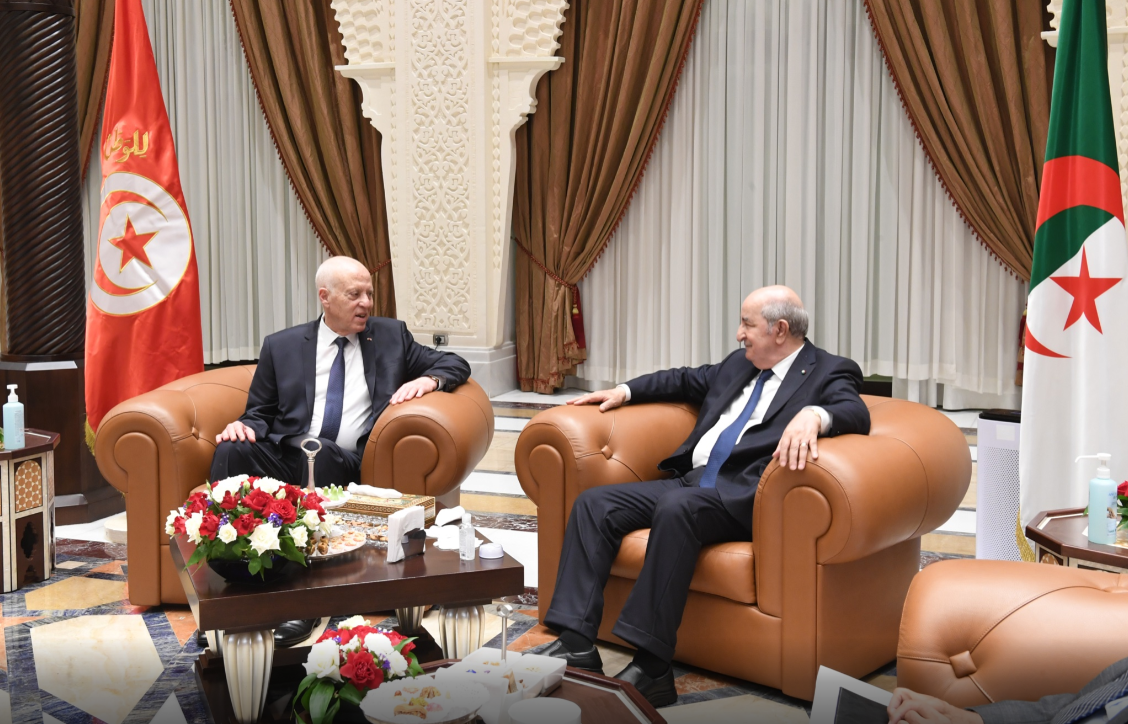In an attempt to intervene in the recent crisis between Tunisian President Kais Saied and the Tunisian General Labor Union, Algerian President Abdelmadjid Tebboune invited President Saied to participate in Algeria’s Independence Day celebrations on July 5th. The invitation coincided with an official invitation to the Secretary-General of the Tunisian Labor Union, Noureddine Taboubi. A statement by the Algerian presidency did not mention the substance of the meeting between the two Tunisian leaders on July 6th, noting only that the reception ceremony took place in the presence of the Secretary-General of the General Union of Algerian Workers, Salim Labatta, in addition to the Director of the Office of the Presidency of the Republic, Abdulaziz Khalaf. That said, the meeting’s connection to the political crisis in Tunisia is clear, as is President Tebboune’s desire to bridge the gap between the two sides to bring the crisis to an end.
Mediation featured noticeably in President Tebboune’s statements during President Saied’s farewell, in which he said: “I wish all the best to the brothers in Tunisia, and I hope that the next constitution will be very popular with Tunisians.” Algeria had expressed an interest in the issue since the crisis erupted in July 2021, after Tunisian President Kais Saied announced a number of decrees, subsequently freezing Parliament and lifting immunity from its members. President Tebboune quickly reached out to President Saied, and there have been since then repeated visits by Algerian Foreign Minister Ramtane Lamamra to Tunisia. This interest reflects the historical ties between the two countries, and Tunisia’s pivotal position in Algeria’s foreign policy. Tunisia has been considered a safe and stable neighbor in an otherwise turbulent regional environment.
Algeria has also taken steps to support the Tunisian economy, such as granting interest-free loans, providing logistical assistance in the areas of training and anti-terrorism, as well as health assistance to confront the coronavirus. The two are also cooperating in the fields of gas and Algerian tourism to Tunisia. Algeria announced on July 6th it was reopening the land border with Tunisia, following a closure of two years, since March 2020.
Algeria’s serious effort to mediate in Tunisia’s political crisis could possibly be linked to pressure from Algerian Islamist parties, allowed by President Tebboune to participate in the recent parliamentary elections, thereby gaining representation in parliament. These parties may wish the Algerian president to encourage President Saied to settle the crisis with the Ennahda Movement, or at least to pardon its members and avoid putting them on trial.
Algeria’s goals
Algeria’s efforts to bring the crisis in Tunisia stem from a number of considerations it deems important, including:
Avoiding a boycott of the referendum: The draft for a new Tunisian constitution, published in the Official Gazette in early July, has caused severe polarization on the political scene, with some seeing it as an opportunity for reform , while others are calling for a boycott of the referendum, in order to undermine the entire project.The Tunisian General Labor Union, which is considered the largest trade union organization in Tunisia, declared that the new draft constitution gave the president broad powers while limiting the authority of other institutions. It therefore rejected the draft and withdrew from the dialogue called for by the President.
However, after Saied and Tabboubi, the Union head, met with President Tebboune, the Labor Union changed its stance. The union’s administrative body decided not to boycott the referendum, leaving it up to members to decide on the question of participation.
Avoiding instability in Tunisia: Algeria’s unprecedented interest in the situation in Tunisia is linked to fears instability there may spillover the borders. Algeria is concerned about the possibility terrorist organizations could exploit the unstable political situation in Tunisia, especially as some armed militias stationed in western Libya appear to be preparing to move to Tunisia. This would have negative consequences on Algerian.
Support in rising competition with Morocco: Algeria has an interest in maintaining close ties with Tunisia as a source of support in its escalating tensions with Morocco over a number of regional issues. While Tunisian-Algerian closeness was demonstrated by President Saied’s participation in Algeria’s Independence Day celebrations, and in Algeria’s mediation efforts, Tunisian Moroccan relations are cool. Tunisia witnessed only one visit from Moroccan Foreign Minister Nasser Bourita since its political crisis erupted. The Moroccan foreign minister carried a message from King Mohammed VI, confirming Morocco’s solidarity with the Tunisian people’s aspirations for stability.
Reducing instability on its borders: Algeria is currently exposed to several threats from its regional neighborhood, especially the rise of terrorism and organized crime, and the proliferation of weapons. This is in addition to the geopolitical upheaval related to the collapse of the state in Libya, the difficulty of restoring stability in Mali, the dispute over the Western Sahara with Morocco, as well as the increasing foreign military presence in the African Sahel.
This has driven Algerian interest in ending political turmoil in Tunisia, in order to achieve stability on that front.
The numerous threats from the neighborhood to Algeria’s national security motivate it to find a resolution to the political crisis in Tunisia. While it is carefully monitoring the situation, it is likely to side with the parties that can preserve its interests, namely the ruling authority headed by Kais Saied, and the Tunisian army. It will probably seek to do so in an indirect manner, to avoid provoking the Islamist parties in Algeria, and to maintain its declared principle of non-interference in the domestic affairs of its neighbors.

